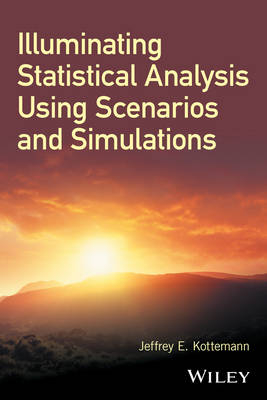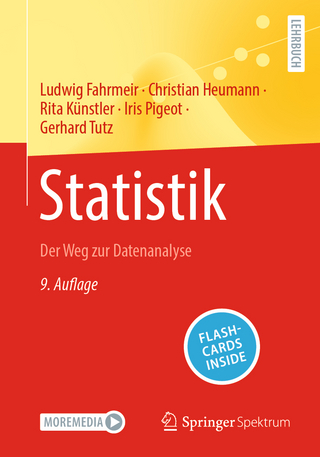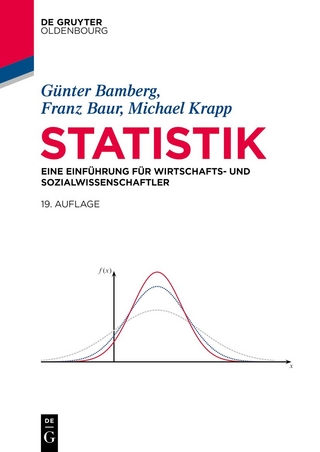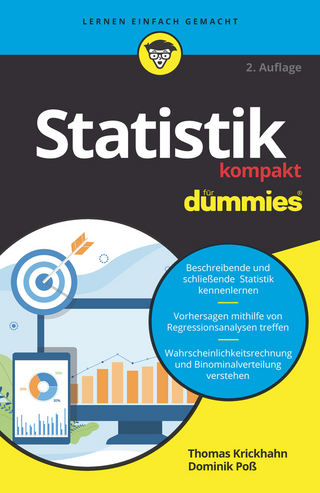
Illuminating Statistical Analysis Using Scenarios and Simulations
John Wiley & Sons Inc (Verlag)
978-1-119-29633-1 (ISBN)
Illuminating Statistical Analysis Using Scenarios and Simulations presents the basic concepts of statistics and statistical inference using the dual mechanisms of scenarios and simulations. This approach helps readers develop key intuitions and deep understandings of statistical analysis. Scenario-specific sampling simulations depict the results that would be obtained by a very large number of individuals investigating the same scenario, each with their own evidence, while graphical depictions of the simulation results present clear and direct pathways to intuitive methods for statistical inference. These intuitive methods can then be easily linked to traditional formulaic methods, and the author does not simply explain the linkages, but rather provides demonstrations throughout for a broad range of statistical phenomena. In addition, induction and deduction are repeatedly interwoven, which fosters a natural "need to know basis" for ordering the topic coverage.
Examining computer simulation results is central to the discussion and provides an illustrative way to (re)discover the properties of sample statistics, the role of chance, and to (re)invent corresponding principles of statistical inference. In addition, the simulation results foreshadow the various mathematical formulas that underlie statistical analysis.
In addition, this book:
• Features both an intuitive and analytical perspective and includes a broad introduction to the use of Monte Carlo simulation and formulaic methods for statistical analysis
• Presents straight-forward coverage of the essentials of basic statistics and ensures proper understanding of key concepts such as sampling distributions, the effects of sample size and variance on uncertainty, analysis of proportion, mean and rank differences, covariance, correlation, and regression
• Introduces advanced topics such as Bayesian statistics, data mining, model cross-validation, robust regression, and resampling
• Contains numerous example problems in each chapter with detailed solutions as well as an appendix that serves as a manual for constructing simulations quickly and easily using Microsoft® Office Excel®
Illuminating Statistical Analysis Using Scenarios and Simulations is an ideal textbook for courses, seminars, and workshops in statistics and statistical inference and is appropriate for self-study as well. The book also serves as a thought-provoking treatise for researchers, scientists, managers, technicians, and others with a keen interest in statistical analysis.
Jeffrey E. Kottemann, Ph.D., is Professor in the Perdue School at Salisbury University. Dr. Kottemann has published articles in a wide variety of academic research journals in the fields of business administration, computer science, decision sciences, economics, engineering, information systems, psychology, and public administration. He received his Ph.D. in Systems and Quantitative Methods from the University of Arizona.
Jeffrey E. Kottemann, Ph.D., is Professor in the Perdue School at Salisbury University. Dr. Kottemann has published articles in a wide variety of academic research journals in the fields of business administration, computer science, decision sciences, economics, engineering, information systems, psychology, and public administration. He received his Ph.D. in Systems and Quantitative Methods from the University of Arizona.
Preface ix
Acknowledgements xi
Part I Sample Proportions and the Normal Distribution 1
1 Evidence and Verdicts 3
2 Judging Coins I 5
3 Brief on Bell Shapes 9
4 Judging Coins II 11
5 Amount of Evidence I 19
6 Variance of Evidence I 23
7 Judging Opinion Splits I 27
8 Amount of Evidence II 31
9 Variance of Evidence II 35
10 Judging Opinion Splits II 39
11 It Has Been the Normal Distribution All Along 45
12 Judging Opinion Split Differences 49
13 Rescaling to Standard Errors 53
14 The Standardized Normal Distribution Histogram 55
15 The z-Distribution 59
16 Brief on Two-Tail Versus One-Tail 65
17 Brief on Type I Versus Type II Errors 69
Part II Sample Means and the Normal Distribution 75
18 Scaled Data and Sample Means 77
19 Distribution of Random Sample Means 79
20 Amount of Evidence 81
21 Variance of Evidence 83
22 Homing in on the Population Mean I 87
23 Homing in on the Population Mean II 91
24 Homing in on the Population Mean III 93
25 Judging Mean Differences 95
26 Sample Size, Variance, and Uncertainty 99
27 The t-Distribution 105
Part III Multiple Proportions and Means: The X2- and F-Distributions 111
28 Multiple Proportions and the X2-Distribution 113
29 Facing Degrees of Freedom 119
30 Multiple Proportions: Goodness of Fit 121
31 Two-Way Proportions: Homogeneity 125
32 Two-Way Proportions: Independence 127
33 Variance Ratios and the F-Distribution 131
34 Multiple Means and Variance Ratios: ANOVA 137
35 Two-Way Means and Variance Ratios: ANOVA 143
Part IV Linear Associations: Covariance, Correlation, and Regression 147
36 Covariance 149
37 Correlation 153
38 What Correlations Happen Just by Chance? 155
39 Judging Correlation Differences 161
40 Correlation with Mixed Data Types 165
41 A Simple Regression Prediction Model 167
42 Using Binomials Too 171
43 A Multiple Regression Prediction Model 175
44 Loose End I (Collinearity) 179
45 Loose End II (Squaring R) 183
46 Loose End III (Adjusting R-Squared) 185
47 Reality Strikes 187
Part V Dealing with Unruly Scaled Data 193
48 Obstacles and Maneuvers 195
49 Ordered Ranking Maneuver 199
50 What Rank Sums Happen Just by Chance? 201
51 Judging Rank Sum Differences 203
52 Other Methods Using Ranks 205
53 Transforming the Scale of Scaled Data 207
54 Brief on Robust Regression 209
55 Brief on Simulation and Resampling 211
Part VI Review and Additional Concepts 213
56 For Part I 215
57 For Part II 221
58 For Part III 227
59 For Part IV 233
60 For Part V 243
Appendices 247
A Data Types and Some Basic Statistics 249
B Simulating Statistical Scenarios 253
C Standard Error as Standard Deviation 271
D Data Excerpt 273
E Repeated Measures 277
F Bayesian Statistics 281
G Data Mining 287
Index 295
| Erscheinungsdatum | 28.03.2017 |
|---|---|
| Verlagsort | New York |
| Sprache | englisch |
| Maße | 158 x 236 mm |
| Gewicht | 544 g |
| Themenwelt | Mathematik / Informatik ► Mathematik ► Statistik |
| ISBN-10 | 1-119-29633-1 / 1119296331 |
| ISBN-13 | 978-1-119-29633-1 / 9781119296331 |
| Zustand | Neuware |
| Informationen gemäß Produktsicherheitsverordnung (GPSR) | |
| Haben Sie eine Frage zum Produkt? |
aus dem Bereich


